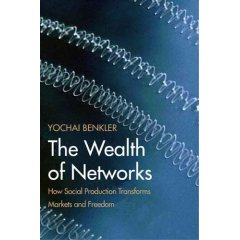 The information commons movement has great stories, and with the new book The Wealth of Networks, Yochai Benkler is establishing himself as another of its great storytellers.
The information commons movement has great stories, and with the new book The Wealth of Networks, Yochai Benkler is establishing himself as another of its great storytellers.
At a book talk last night, Benkler outlined an economic history of information production. We're moving from the age of industrial information production to one of social information production. Ever-faster computers on our desks let us individually produce what would have taken a firm to organize just a decade ago. Ever-further networks let us share that with the world as cheaply as storing it for ourselves. This "social production" is distributed and motivated by social relationships rather than market signals.
As Benkler contextualizes this activity, it's not outside or in opposition to economics, but part of the economy. Commons production can be used by market-driven actors and by ideologically motivated purists. As it spreads, though, it enhances not only bottom lines but political freedom.
In an example near to my heart, Benkler showed the pressures e-voting vendor Diebold faced from the circulation of source code and internal emails. But in Benkler's story, the chief heroes weren't the lawyers wyho stepped up to defend against claims of copyright infringement -- after all, it took a year before the court ordered Diebold to pay our costs and fees -- but the distributed participants who published and kept the memos and code online in the face of legal threats. Even without the legal muscle of a New York Times, activists kept the story alive through social propagation.
Benkler's slide set ended at a moment of conflict. The new modes of social information production threaten established industries and so industral infogiants fight back with old weapons: legislation such as DMCA, monopoly power in non-neutral networks, patent thickets. Yet Benkler is an optimist. He's leaving future slides to be completed by the socially organized forces he celebrates. Here's the wiki!